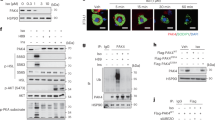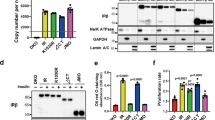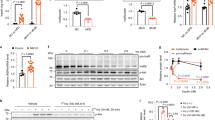Abstract
Insulin and insulin receptor substrate 1 (IRS-1) are capable of protecting liver cells from apoptosis induced by transforming growth factor-β (TGF-β). The Ras/mitogen-activated protein kinase (MAP kinase) and the phosphatidylinositol 3-kinase (PI 3-kinase)/Akt pathways are both activated upon insulin stimulation and can protect against apoptosis under certain circumstances. We investigated which of these pathways is responsible for the protective effect of insulin on TGF-β-induced apoptosis. An activated Ras, although elicited a strong mitogenic effect, could not protect Hep3B cells from TGF-β-induced apoptosis. Furthermore, PD98059, a selective inhibitor of MEK, did not suppress the antiapoptotic effect of insulin. In contrast, the PI 3-kinase inhibitor, LY294002, efficiently blocked the effect of insulin. Protection against TGF-β-induced apoptosis conferred by PI 3-kinase was further verified by stable transfection of an activated PI 3-kinase. Downstream targets of PI 3-kinase involved in this protection was further investigated. An activated Akt mimicked the antiapoptotic effect of insulin, whereas a dominant-negative Akt inhibited such effect. However, rapamycin, the p70S6 kinase inhibitor, had no effect on the protectivity of insulin against TGF-β-induced apoptosis, suggesting that the antiapoptotic target of PI 3-kinase/Akt pathway is independent or lies upstream of the p70S6 kinase. The mechanism by which PI 3-kinase/Akt pathway interferes with the apoptotic signaling of TGF-β was explored. Activation of PI 3-kinase did not lead to a suppression of Smad hetero-oligomerization or nuclear translocation but blocked TGF-β-induced caspase-3-like activity. In summary, the PI 3-kinase/Akt pathway, but not the Ras/MAP kinase pathway, protects against TGF-β-induced apoptosis by inhibiting a step downstream of Smad but upstream of caspase-3.
This is a preview of subscription content, access via your institution
Access options
Subscribe to this journal
Receive 50 print issues and online access
$259.00 per year
only $5.18 per issue
Buy this article
- Purchase on Springer Link
- Instant access to full article PDF
Prices may be subject to local taxes which are calculated during checkout
Similar content being viewed by others
Author information
Authors and Affiliations
Rights and permissions
About this article
Cite this article
Chen, RH., Su, YH., Chuang, R. et al. Suppression of transforming growth factor-β-induced apoptosis through a phosphatidylinositol 3-kinase/Akt-dependent pathway. Oncogene 17, 1959–1968 (1998). https://doi.org/10.1038/sj.onc.1202111
Received:
Revised:
Accepted:
Published:
Issue Date:
DOI: https://doi.org/10.1038/sj.onc.1202111
Keywords
This article is cited by
-
Targeting TGFβ signal transduction for cancer therapy
Signal Transduction and Targeted Therapy (2021)
-
PI3K/mTORC2 regulates TGF-β/Activin signalling by modulating Smad2/3 activity via linker phosphorylation
Nature Communications (2015)
-
Caveolin-1 abrogates TGF-β mediated hepatocyte apoptosis
Cell Death & Disease (2013)
-
Cancer cachexia—pathophysiology and management
Journal of Gastroenterology (2013)
-
The role of myostatin in muscle wasting: an overview
Journal of Cachexia, Sarcopenia and Muscle (2011)



